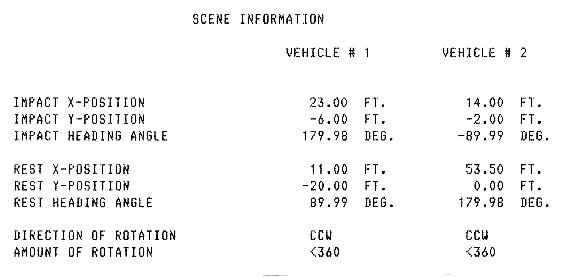
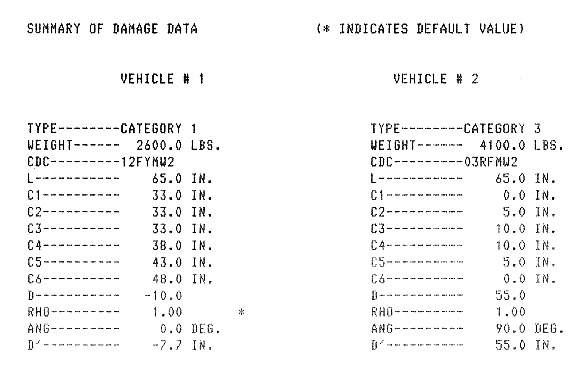
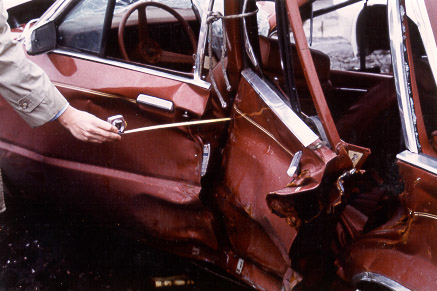
Figure 1
accident reconstruction. One of these computer programs is called Calspan
Reconstruction of Accident Speeds on the Highway or CRASH for short. This
computer program calculates the impact speeds and changes of vehicle velocity
during an accident.
Figure 1 shows typical information that is fed to the computer. The scene
information describes to the computer the locations of the vehicle rest
position, the expected impact position and direction of rotation. Next
information must be supplied to the computer concerning the characteristics of
the vehicle (weight, stiffness, model) as well as measurements of vehicle crush.
The crush depth along the damaged portion of the automobile is indicated by the
variables C1 through C6. So in Figure 1, L indicates that the damage width is 65
inches while the crush depths vary from 33 inches to 44 inches. The photograph
in Figure 1 shows typical measurement of crush depth. Finally, the last piece of
information supplied to the computer describes the frictional properties of the
road at the time of the accident.
Figure 2 is the computer printout of the accident reconstruction. Under the
printout for vehicle number 1, the impact speed was 44 mph forward and 14.3 mph
laterally or to the right. This indicates that vehicle number 1 was attempting
to turn right to avoid the collision. The printout for vehicle number 2 shows a
forward speed of -2.2 mph which means the vehicle is moving backwards at 2.2 mph
and a lateral speed of 46 mph to the right, which means that vehicle number 2
was in a sideways skid at 46 mph at impact. The speed change calculations
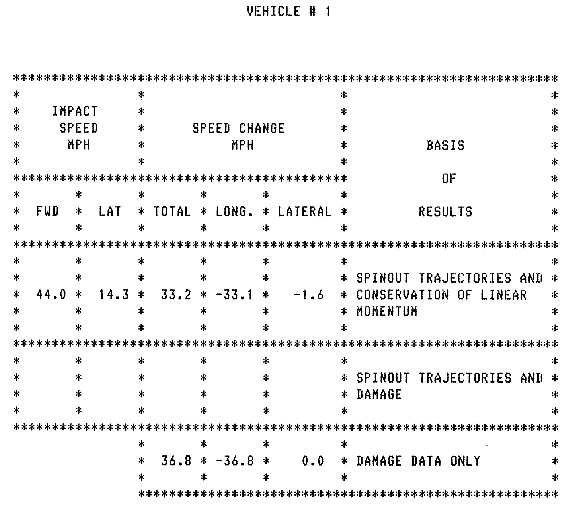
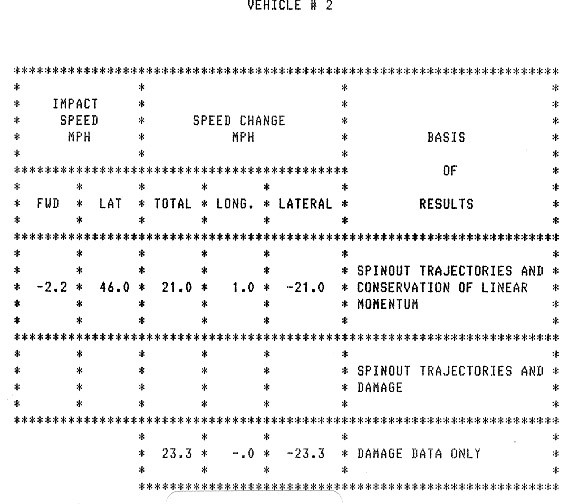
Figure 2
indicate the severity of the crash and are often used in determination of the
chances of occupant survival. The CRASH computer program is available from the
National Technical Information Service and is also available from private
software vendors.
The CRASH computer program is based on Newton's Laws of Motion and principles of
conservation of energy. It contains diagnostics that warn the user of improper
or unreasonable input data. The CRASH computer program is a useful tool for
analyzing the complexities of automobile accidents.
FOR TECHNICAL ARTICLES CONTACT CLAIMS MAGAZINE AND ASK
FOR A REPRINT OF A PAST TECHNICAL NOTEBOOK ARTICLE
CLAIMS MAGAZINE
BACK TO C. ROBERTS CONSULTING ENGINEERS HOME PAGE,
WWW.CROBERTS.COM


Figure 2
The CRASH computer program is based on Newton's Laws of Motion and principles of conservation of energy. It contains diagnostics that warn the user of improper or unreasonable input data. The CRASH computer program is a useful tool for analyzing the complexities of automobile accidents.
FOR TECHNICAL ARTICLES CONTACT CLAIMS MAGAZINE AND ASK
FOR A REPRINT OF A PAST TECHNICAL NOTEBOOK ARTICLE
CLAIMS MAGAZINE
BACK TO C. ROBERTS CONSULTING ENGINEERS HOME PAGE,
WWW.CROBERTS.COM
WWW.CROBERTS.COM